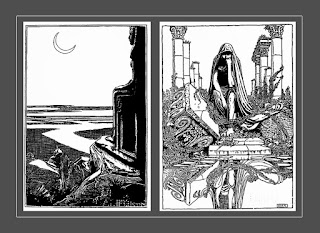Poe as The Tramp
 |
| Charlie Chaplin and Virginia Cherrill in City Lights (1931) |
If you ever doubted that “less is more,” consider this very short poem by Edgar Allan Poe:
I heed not that my
earthly lot
Hath little of Earth
in it,
That years of love
have been forgot
In the hatred of a
minute:
I mourn not that the
desolate
Are happier, sweet,
than I,
But that you sorrow for my fate
Who am a passer-by.
Originally titled “Alone” when it was first penned in 1827, it was subsequently called “To M—,” and sometimes simply “To —” in later publications. Little is known about this poem, penned when Poe was 19, including the identity of Poe’s Muse or the back-story of their relationship.
The poem is, to my mind, an elegant and concise example of Poe’s mastery of meter and poetic devices; in the words of editor Thomas Ollive Mabbott, “worthy of the term ‘perfect’.”
The lines are alternatingly eight and six syllables long. The rhyme scheme is A-B-A-B (“lot,” “in it;” “forgot,” “minute”) for the first quatrain and C-D-C-D (“des – o – late,” “I;” “fate,” “passer-by”) for the second quatrain. The poem is barren of imagery and its brevity and minimalism leave the impression that there isn’t much there, but this is in support of the poem’s overall impression of poverty and want.
Quite strikingly, Poe defines himself here only by negation: “I heed not;” “I mourn not.” There is not a positive affirmation of what he is or does; instead, Poe tells us what he does not do.
He also tells us what he does not have: “little of earth;” little of love (because it has been lost in the hatred of a minute); and little of joy (because even the desolate are happier).
Finally, he defines himself not by explicitly describing what he is, but in comparison to others (“the desolate / Are happier ... than I”). It’s as if he is not even there!
Once he has effectively written himself out of the picture by not describing himself directly, but only by negation and in comparison to others, Poe reserves, literally, the last word in the poem to finally tell us what he is: “a passer-by,” a guy in the backdrop, an also-ran in his own poem!
By now, we see that any lack of depth in this poem is purely an illusion, because each line packs cleverly-crafted devices to carry the overall theme. Each couplet or two-line pairing presents either an ironic statement or thematic juxtaposition: the first two lines tell us that his “earthly lot” contains little “of earth;” the second two lines, that “years of love” were destroyed in “a minute” of hate; and, finally, in the third two-line pair, that the saddest people in the world are still happier than our poor interlocutor.
In the end, the poem contains several motifs that characterize Poe’s poetry. There is a certain fatalism and self-pity that recalls Petrarch (“Myself I hate and would another woo”), especially in the way it places a female subject up in a pedestal where she becomes, ironically, out of reach (see, e.g., “For Annie,” “To Helen”). The self-pity here is imbued with a sense of Poe bewailing his own financial troubles; left out of his foster father’s will, he scrapes by (“my earthly lot / Hath little of earth in it”).
But, in presenting this bleak and impoverished backdrop, Poe is setting up a final, ultimate contrast, when he reserves the single rich note to describe his Muse. She, alone, we are told in this poem, is
… sweet …
And so is this poem, a little masterpiece of feigned minimalism masking elegant succinctness.




Comments
Post a Comment